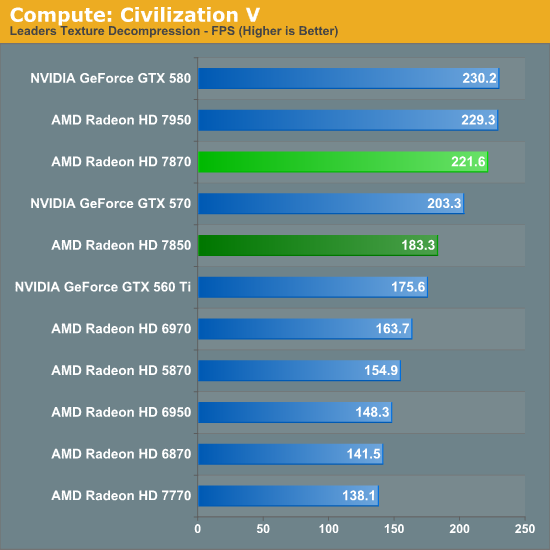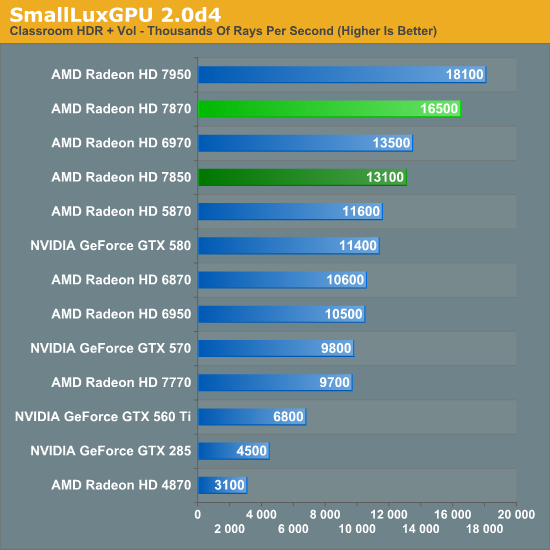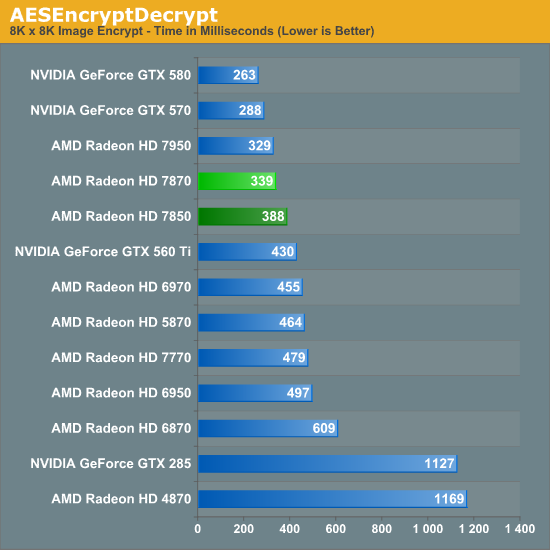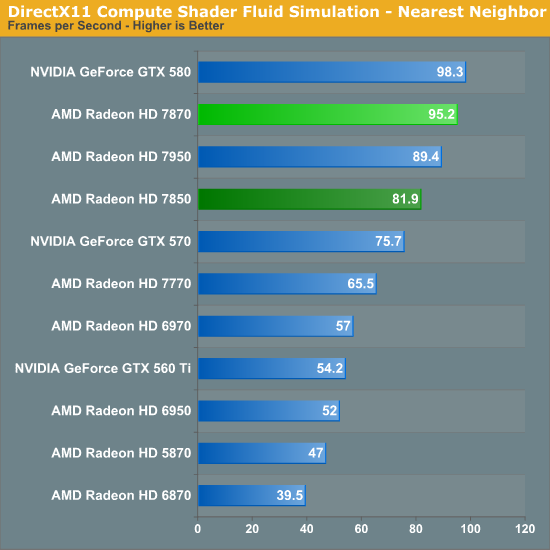AMD Radeon HD 7870 GHz Edition & Radeon HD 7850 Review: Rounding Out Southern Islands
by Ryan Smith on March 5, 2012 12:01 AM ESTCompute Performance
Moving on from our look at gaming performance, we have our customary look at compute performance. With GCN AMD significantly overhauled their architecture in order to improve compute performance, as their long-run initiatives rely on GPU compute performance becoming far more important than it is today.
Our first compute benchmark comes from Civilization V, which uses DirectCompute to decompress textures on the fly. Civ V includes a sub-benchmark that exclusively tests the speed of their texture decompression algorithm by repeatedly decompressing the textures required for one of the game’s leader scenes. Note that this is a DX11 DirectCompute benchmark.

The Civ V compute shader benchmark once again shows off just how much the compute shader performance of the 7800 series has improved relative to the 6900 series, with both 7800 cards coming in well, well ahead of any previous generation AMD cards. Compared to NVIDIA’s lineup the 7800 series does fairly well for itself too, although not quite as well as the commanding lead the 7900 series took.
Our next benchmark is SmallLuxGPU, the GPU ray tracing branch of the open source LuxRender renderer. We’re now using a development build from the version 2.0 branch, and we’ve moved on to a more complex scene that hopefully will provide a greater challenge to our GPUs.

SmallLuxGPU continues to showcase the 7800 series’ improvements over past AMD architectures, and while it’s not the same kind of massive leap we saw with CivV, it’s still enough to bring the 7850 up to near the performance of the 6970, and pushing the 7870 well beyond that. The only real competition here for AMD is AMD.
For our next benchmark we’re looking at AESEncryptDecrypt, an OpenCL AES encryption routine that AES encrypts/decrypts an 8K x 8K pixel square image file. The results of this benchmark are the average time to encrypt the image over a number of iterations of the AES cypher.

On the one hand, the 7870 gets quite close to the 7950 here in our AESEncryptDecrypt benchmark, in spite of the latter’s higher number of shaders. On the other hand, it’s still not enough to dethrone the GTX 570; the only NVIDIA cards the 7800 series can beat start at the GTX 560 Ti.
Finally, our last benchmark is once again looking at compute shader performance, this time through the Fluid simulation sample in the DirectX SDK. This program simulates the motion and interactions of a 16k particle fluid using a compute shader, with a choice of several different algorithms. In this case we’re using an (O)n^2 nearest neighbor method that is optimized by using shared memory to cache data.

In our final compute test the 7800 series once again makes a run at the top, with both cards rising past the GTX 570, although they can’t quite match the GTX 580. In an interesting turn of events the 7870 ends up being some 6% faster than the 7950, in spite of the fact that in a compute benchmark the 7950 should have a solid lead. This just goes to show that core clockspeeds do matter, and that adding more shaders alone can’t conquer all benchmarks.










173 Comments
View All Comments
Exodite - Tuesday, March 6, 2012 - link
I have absolutely no problem with that.The apt comparison would be the 7900 series though, and those only really fail on price.
Which will likely change if Nvidia brings something competitive to the high end with Kepler.
Lets face it, until the current consoles die in a fire and/or display makers see fit to bring sensibly priced >1080p panels to the desktop there's really no need for more performance in the desktop space.
SlyNine - Monday, March 5, 2012 - link
The fact the things are sitting still.I'm running a 5870 which is basically 75% the performance of a 7970, and I paid 379 for the 5870. Which is also 75% of the cost of a 7970. The price of a 7970 is basically the exact same price structure as the 2 1/2 year old 5870, So we are stuck where we were in 2009, yay.
This is NOT how the computer world is supposed to work, and as big geek, I don't like it.
morfinx - Monday, March 5, 2012 - link
75% performance of 7970 would mean that it's 33% faster than a 5870. And that's just not accurate. I have a 5870 as well, so I was paying a lot of attention on how much faster the 7970 is in various reviews. Everything I've read indicates that it's anywhere from 70-110% faster at 2560x1600 resolution (I run 3600x1920, so likely even even more of a difference). That's not even even considering the massive overclocking headroom of the 7970 vs barely any OC headroom of the 5870. Overclocked, a 7970 is easily twice as fast as a 5870.Alpert - Tuesday, March 6, 2012 - link
The 6950 retailed for $299 and the 6970 retailed for $369 when they were released. 10-25% performance increase for every new series of cards is what to expect. Now we can clearly see these card perform better then the 6950/6970, hell a 7850 overclocks to what a GTX580 is capable of.The value of what was a $600 GTX580 card more then a year ago, The value of a $499 GTX580 today, you get a $300 7850.
The price you pay for performance is always going down just not in big steps.
Logsdonb - Monday, March 5, 2012 - link
These should be excellent cards for crossfire solutions, especially when combined with the new PCI 3.0 bus system. They represent significant improvements in heat, power, and noise at their performance levels. I think these would work well in small form factor gaming PCs, especially when combined with the upcoming Ivy Bridge CPUs, which max out at 77 watts. I don't want a loud, space heater that sucks down massive power for a computer. I have also noticed that cooler systems tend to last longer and have few problems. I feel confident that the prices will come down once the competition from Nvidia comes out next month.I am thinking that we are approaching a really nice time to upgrade if you like balanced systems that deliver excellent gaming performance in reasonable portable packages that wont disturb your personal environment with excess heat and noise. I intend on waiting for Ivy bridge and Kepler before pulling the trigger, but I am eagerly awaiting upgrading evertyhing.
claysm - Monday, March 5, 2012 - link
The price point on the 7xxx series cards seems to be a little too high at the moment, the only advantage they have is that that do outperform the GTX 5xx series cards in a number of ways (power consumption, performance, temps). The biggest problem with the 7xxx series is that they just don't perform that much higher at each price point than AMD's current 6xxx series cards. Why get a 7770 when you can, for the same money and MUCH more performance, get a 6870? The prices will drop when Kepler rolls around I'm sure, but for now, a little too high, given that most of the increases at each price point don't come in the realm of performance.CeriseCogburn - Thursday, March 8, 2012 - link
AMD has been listening to their little screaming fans who wailed that electric usage and core temps are all the rage....So now the amd fans need to PAY UP SOME $$$ for the nice electric consumption and core temp reduction... let's face it - they have told us all for years now those two things alone are well worth a purchase decision, PERIOD.
I guess it's time for them to dig down deep since their Master has responded with everything they declared of utmost importance.
What's wrong AMD fans ?
BrightCandle - Monday, March 5, 2012 - link
I would love to see Anandtech start to look into the stutter/inconsistent frame problems with these modern graphics card reviews. The techreport has been doing a good job in blowing the lid on the problem, but you guys should be able to start to apply pressure to AMD/NVidia to improve the situation. The minimum average is not the worst it can be, the worst frame time is what you need to worry about. Averages over a second just aren't accurate enough.loeakaodas - Monday, March 5, 2012 - link
These look like great performing cards that need a $50~$100 price drop & hopefully nVidia's new offering will force AMD to compete like they did with the legendary 4800 & 5800 series. I was hoping for a sensible upgrade path from my 2x5850's but it doesn't look like that exists yet, at least not at these price points. I'm better off of putting that money towards a large SSD upgrade, otherwise this midrange 2.5 year old system doesn't really beg for an upgrade.ET - Monday, March 5, 2012 - link
The OC 7850 beats everything hands down at the 2560x1600 resolution, which doesn't look right considering the rest of the benchmarks.Also, on the Skyrim benchmark page the writeup has "GPUs GPUs" on it.